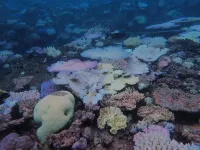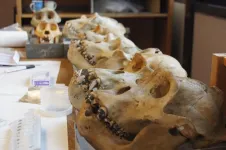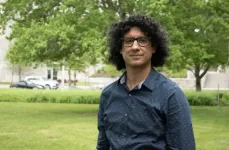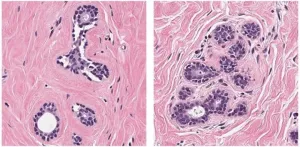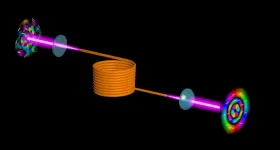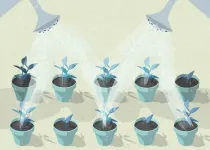(Press-News.org) HOUSTON - Researchers at The University of Texas MD Anderson Cancer Center have developed a first-of-its-kind spatial atlas of early-stage lung cancer and surrounding normal lung tissue at single-cell resolution, providing a valuable resource for studying tumor development and identifying new therapeutic targets. The study was published today in Cancer Discovery, a journal of the American Association for Cancer Research.
The findings reveal a heterogeneous lung cancer ecosystem, with extensive interactions between cancer cells and the surrounding microenvironment that regulate early cancer development. By studying the crosstalk between the tumor and surrounding immune cells, researchers identified and validated CD24, an immune checkpoint protein, as a new immunotherapy target for lung cancer treatment.
"Our study is the first to look at this through spatial mapping of multi-region normal tissues and the tumor itself at the single-cell level," said co-senior author Humam Kadara, Ph.D., associate professor of Translational Molecular Pathology. "This work provides new insights into how lung adenocarcinomas evolve from a particular region in the lung and already has pointed us to a promising new therapeutic target in CD24."
Through this work, the research team sought to gain a better understanding of how and why lung tumors develop in a particular region of the lung versus another. This understanding offers opportunities not only to better treat early-stage cancers, but also to improve screening and prevention strategies.
The research was led by Ansam Sinjab, Ph.D., postdoctoral fellow in Translational Molecular Pathology, and Guangchun Han, Ph.D., postdoctoral fellow in Genomic Medicine. To construct this single-cell map, the multidisciplinary team performed single-cell RNA sequencing of 186,916 cells from five early-stage lung cancers and 14 normal lung tissue samples.
"This high-resolution spatial mapping generated a much more complete picture of lung cancer than was previously available, and we believe this will be a valuable resource to the research community," said co-senior author Linghua Wang, M.D., Ph.D., assistant professor of Genomic Medicine. "We now have a greater understanding of the tremendous heterogeneity of diverse cell populations within the tumor immune microenvironment and of the importance of tumor-microenvironment interactions in regulating cancer progression."
The analysis revealed significant heterogeneity within a given tumor and across multiple tumors. Further, while normal lung epithelial cells were distinct from the tumor cells, those closer to the tumor shared more similarities with the tumor cells compared to distant normal tissue. These signatures also were evident in precancerous lesions compared to normal lung tissue, suggesting the data may be useful in identifying markers for early detection or prevention.
Similar trends were observed when looking at immune cells. With increasing proximity to the tumor, the researchers observed a shift in immune cell composition and signals toward a pro-tumor, immunosuppressive environment. Interestingly, specific immune populations were present in samples from smokers that were absent in those from non-smokers.
By examining interactions between the tumor and immune microenvironment, the researchers discovered that CD24, highly expressed in lung cancer cells, is a pivotal point of interaction between cancer cells and immune cells. In independent cohorts of early-stage lung cancers, CD24 expression correlated with poor clinical outcomes and shortened survival. Further, blocking CD24 significantly reduced the growth of lung cancers in animal models.
Going forward, the researchers will continue experiments to identify the best strategy for targeting CD24 therapeutically, with the goal of performing future clinical studies to evaluate new treatment strategies for patients with early-stage lung cancer.
The research team continues to analyze additional patient samples to expand the data resource, taking a deeper dive to understand how immune cell populations change dynamically during early lung cancer development. The researchers also plan to look more closely at how different cancer drivers, such as smoking or genetic mutations, influence the tumor immune microenvironment and its role in the evolution of early-stage lung cancer.
INFORMATION:
The study was supported in part by research funding from Johnson & Johnson, the National Cancer Institute (R01CA205608, 1U2CCA233238, P50 CA016672), The University of Texas SPORE in Lung Cancer (P50CA070907), the National Institutes of Health (1S10OD024977), the Cancer Prevention and Research Institute of Texas (RP150079, RP160668) and MD Anderson. A full list of collaborating authors and their disclosures can be found here.
New research on the growth rates of coral reefs shows there is still a window of opportunity to save the world's coral reefs--but time is running out.
The international study was initiated at the ARC Centre of Excellence for Coral Reef Studies (Coral CoE), which is headquartered at James Cook University (JCU).
Co-author Professor Morgan Pratchett from Coral CoE at JCU said the results show that unless carbon dioxide emissions are drastically reduced the growth of coral reefs will be stunted.
"The threat posed by climate change to coral reefs is already very apparent based on recurrent episodes of mass coral bleaching," Prof Pratchett said. "But changing environmental conditions will have other far-reaching consequences."
Co-author Professor Ryan Lowe, from Coral CoE at The University ...
A new study looking at the evolutionary history of the human oral microbiome shows that Neanderthals and ancient humans adapted to eating starch-rich foods as far back as 100,000 years ago, which is much earlier than previously thought.
The findings suggest such foods became important in the human diet well before the introduction of farming and even before the evolution of modern humans. And while these early humans probably didn't realize it, the benefits of bringing the foods into their diet likely helped pave the way for the expansion of the human brain because of the glucose in starch, which is the brain's main fuel source.
"We think we're seeing evidence of a really ...
ORLANDO, May 10, 2021 -University of Central Florida researchers are building on their technology that could pave the way for hypersonic flight, such as travel from New York to Los Angeles in under 30 minutes.
In their latest research published in the journal Proceedings of the National Academy of Sciences, the researchers discovered a way to stabilize the detonation needed for hypersonic propulsion by creating a special hypersonic reaction chamber for jet engines.
"There is an intensifying international effort to develop robust propulsion systems for hypersonic and supersonic flight that would allow flight through our atmosphere at very high speeds and also allow efficient entry and exit from planetary atmospheres," ...
In a newly published paper, Virginia Tech geoscientists have found that shallow wastewater injection -- not deep wastewater injections -- can drive widespread deep earthquake activity in unconventional oil and gas production fields.
Brine is a toxic wastewater byproduct of oil and gas production. Well drillers dispose of large quantities of brine by injecting it into subsurface formations, where its injection can cause earthquakes, according to Guang Zhai, a postdoctoral research scientist in the Department of Geosciences, part of the Virginia Tech College of Science, and a ...
Breast cancer has recently overtaken lung cancer to become the most common cancer globally, END ...
Endometriosis, a disease found in up to 10 per cent of women, has been enigmatic since it was first described. A new theory developed by researchers at Simon Fraser University suggests a previously overlooked hormone -- testosterone -- has a critical role in its development. The research could have direct impacts on diagnosis and treatment of the disease, signaling hope for women with endometriosis worldwide.
The disease is caused by endometrial tissue growing outside of the uterus, usually in the pelvic area, where it contributes to pain, inflammation, and infertility. But why some women get it, and others do not, has remained unclear.
The new research is based on recent findings that women with endometriosis developed, as fetuses in their mother's womb, under conditions of relatively ...
Admit it: Daily commutes - those stops, the starts, all that stress - gets on your last nerve.
Or is that just me?
It might be, according to a new study from the University of Houston's Computational Physiology Lab. UH Professor Ioannis Pavlidis and his team of researchers took a look at why some drivers can stay cool behind the wheel while others keep getting more irked.
"We call the phenomenon 'accelerousal.' Arousal being a psychology term that describes stress. Accelarousal is what we identify as stress provoked by acceleration events, even small ones," said Pavlidis, ...
The use of multimode optical fibers to boost the information capacity of the Internet is severely hampered by distortions that occur during the transmission of images because of a phenomenon called modal crosstalk.
However, University of Rochester researchers at the Institute of Optics have devised a novel technique, described in a paper in Nature Communications, to "flip" the optical wavefront of an image for both polarizations simultaneously, so that it can be transmitted through a multimode fiber without distortion. Researchers at the University of South Florida and at the University of Southern California collaborated ...
Your local city park may be improving your health, according to a new paper led by Stanford University researchers. The research, published in END ...
After years of criticism for their lack of diversity, programs for high achievers may not be adequately serving their Black and low-income students, a new study shows.
"The potential benefits aren't equally distributed," said lead author and University of Florida College of Education professor Christopher Redding, Ph.D., who evaluated data from gifted programs in elementary schools nationwide. "The conversation up to this point has been about access, with less emphasis on how students perform once in gifted programs."
While academic achievement gains for students overall were modest -- going from ...

